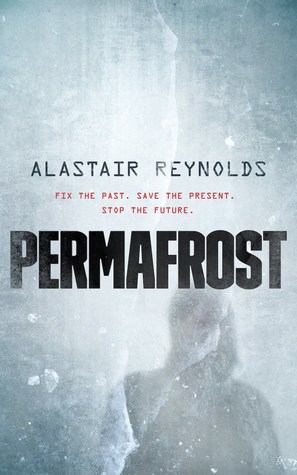

Genre: Science Fiction, Post-apocalyptic time travel
Publisher/ Publication Date: Tor, 2019
Summary
Arctic Circle, 2080. After a horrible bio-disaster named “The Scouring,” humanity is one generation away from extinction. A group of scientists, led by Director Cho, develop a time travelling project (aka Permafrost) to send people back in time. There are some rare, now-extinct seeds that could save humanity by stopping the Scouring.
Valentina is an 71-year-old school teacher and daughter of the brilliant mathematician whose controversial ideas about paradox form the basis of Cho’s work. She is recruited to travel through time, along with some younger scientists named Antti, Vikram, and Miguel. Each will be “dropped” into a person from the past, gain sensorimotor dominance over their host, and work to get the seeds and bring them to the future.
Valentina’s host is Tatiana, a young woman who undergoes brain surgery in 2028. While the host and visitor aren’t supposed to be able to communicate, the two women discover that they can. Things don’t go quite as planned, though. Someone’s working against them. But why?
My thoughts:
I picked up Permafrost from the library’s “new books” section, mainly because the title intrigued me. When I saw that it involved time travel, I added it to my burgeoning pile of library check-outs.
(I walk into the library, fully intending to return one book–Meredith, remember that long TBR list from Netgalley!–and walk out with twenty-three more books. Just in case all the books on Netgalley are duds. Or I get through all the NG books lightning-fast. Or a solar flare kills the internet and I must resort to reading print books. One can rationalize all manner of irrational things, especially when it involves books.)
Time travel has been on my mind in recent weeks. (Blame Avengers: Endgame and my daughter, for making me a Marvel fan against my will.) Thus Alastair Reynolds’ Permafrost ended up on my reading list.
I’m glad it did.
Why did I enjoy this book?
1. Permafrost grabbed me and never let go.
The opening intrigued me.
After I shot Vikram we put our things in the car and drove to the airstrip. (1)
What? The narrator just shot someone. Why? What happened? Who is Vikram? By the end of the second page, I was hooked:
I thought of Vikram, of how he’d followed me out into the field beyond the farm, fully aware of what was coming. I’d taken the artificial larynx with me, just in case there was something he wanted to say at the end. But when I offered it to him he only shook his head, his cataract-clouded eyes seeming to look right through me, (…)
Afterward, Antti had come out with a spade. We couldn’t just leave Vikram lying there in the field.
It hadn’t taken long to bury him.
‘One of us had to do it,’ I answered now, wondering if a speck on my sleeve was blood or just dirt from the field” (2)
This grabbed my attention and my emotions. Obviously the narrator (later revealed as Valentina-in-Tatiana’s body) and Antti care about Vikram enough to give him a decent burial. Why did they have to kill him? Why would he need an artificial larynx to speak? I didn’t get answers until much later. When I did, it broke my heart.
2. The Valentina-Tatiana relationship is powerful.
Valentina has to gain sensorimotor dominance over the host. She doesn’t expect to communicate with her, much less develop a caring relationship with this young troubled woman.
Once Valentina “drops” into Tatiana, she realizes Tatiana is frightened. Who wouldn’t be? But she’s torn: while she doesn’t want to confuse the woman, Valentina has work to do. She’s got to get those seeds and get them back to Director Cho. Complicating matters is that she knows Tatiana’s future, and it’s bleak.
Tatiana, for her part, has issues with Valentina’s presence in her mind. (Who wouldn’t?) Once she hears V’s explanation, she sees clearly that it will not be like “nothing ever happened.” Valentina and company don’t–or refuse to–see this.
For me, the women’s developing relationship is one of the major highlights of the story. Neither are standard-issue superheroes. No superpowers. No cool weapons. Tatiana’s recovering from a stroke. Valentina’s an 71-year-old school teacher. Yet they learn to work together to save the world. It may also save them as people, bringing healing to both wounded women.
3. The science is well-explained.
I know little about the science of time travel, though I’ve heard that scientists have made molecules travel through time. Here, Reynolds’ use of time travel makes sense. While I had to reread a few parts to understand the not-entirely paradoxical paradoxes of his time-travelling system, he didn’t make it overly complicated. It also did not bog down the story.
For die-hard SF fans, Permafrost may or may not satisfy your scientific leanings. Some reviewers on Goodreads were dissatisfied with this aspect of the book. Others commented that it was refreshing to read a “true” science fiction novel without all the “fantasy fluff.”
4. The ending didn’t disappoint me.
No spoilers. Let’s just say that it was emotionally satisfying.
Bottom line:
This is a great novel. Even if you don’t enjoy science fiction, give it a try. Hey, it’s novella length, so it won’t gobble up all your reading time!
This review also appears on Goodreads and Bookbub.
Bonus tips for writers from Permafrost
Don’t get sidetracked by unimportant plot points.
Reynolds doesn’t spend much time discussing how Antti got the seeds from the Finnish seed vault. A few lines of dialogue, that’s it. This could’ve been a longer story, with Antti telling it over multiple pages. Or it could’ve been an entire plot point, with Valentina arriving into Tatiana and joining Antti in raiding the seed vault. Reynolds chooses not to do either. Why?
It’s not that important in the overall story.
It wouldn’t serve any purpose in character development. (It would be ridiculous, anyway. Tatiana’s weakened body is clearly not up for raiding anything.) It wouldn’t deepen the external conflict. (It’s not about whether or not they can get the seeds. It’s about whether they can get them to Cho.) It wouldn’t help develop the internal conflicts, either.
So here’s what I learned: evaluate those “digressions” in the plot. These are the ones that seem oh-so-necessary to explain. Do the explanations take too much time away from the main story’s conflict? Do the explanations add any depth to characterization, story, or setting? Are they necessary? If not, edit down to proper size or cut altogether. Then see if the story still makes sense.
